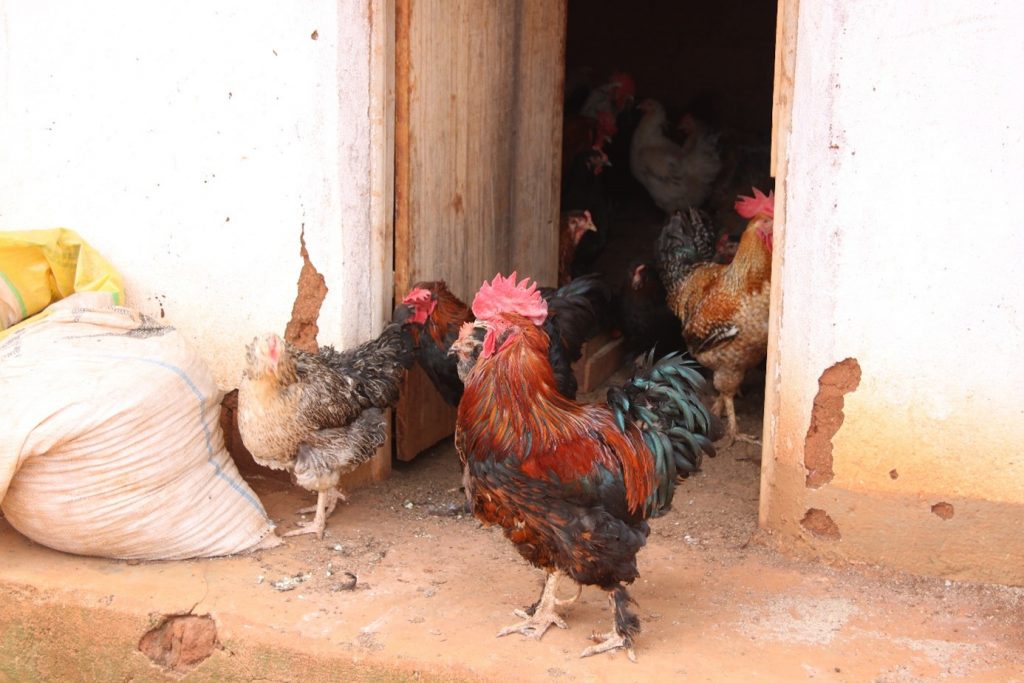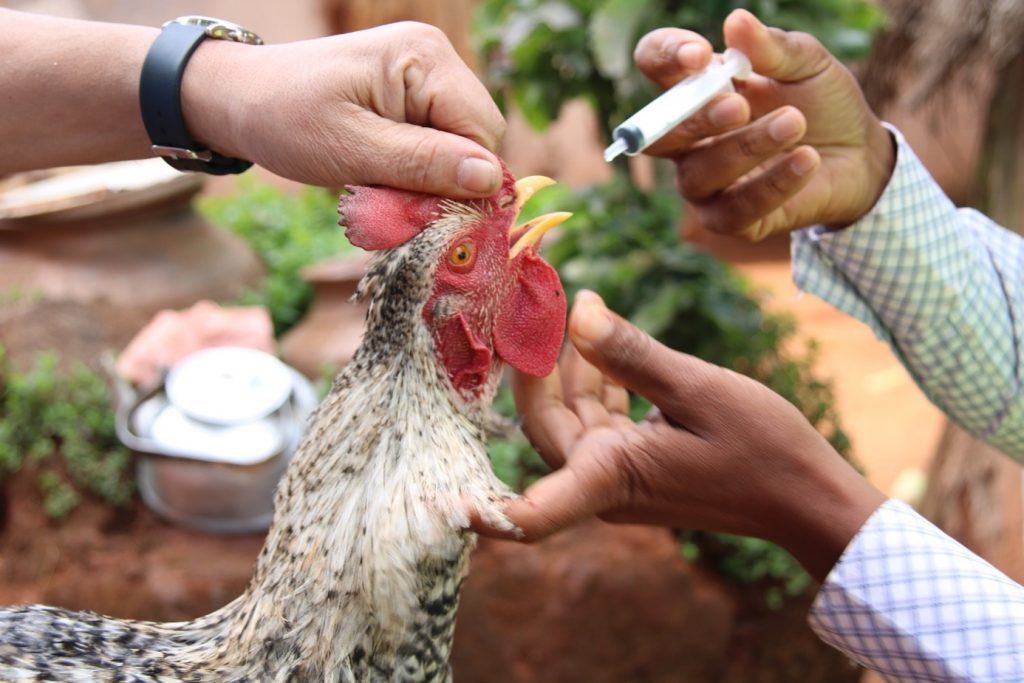
Traditional (backyard) poultry production is of considerable importance for the economy of Cameroon, constituting 60% of the entire poultry production in the country. A major constraint to expansion and increased productivity is the frequent devastation of flocks by Newcastle disease (ND) reportedly up to 90% in some areas. In addition, the occurrence of other epidemic infectious diseases such as Avian Influenza (AI) may lead to the loss of almost the entire flock. The BMZ funded Green Innovation Centers in the Agricultural and Food Sector (ProCISA) are working in partnership with the Ministry of Livestock, Fisheries and Animal Industries (MINEPIA) to improve the village backyard poultry value chain in the West, Northwest and Adamawa Region of Cameroon.
Since inception in 2017, ProCISA has set-up 20 Animal Health Development Posts (Cabinet vétérinaire) in the project areas. A community-based approach developed in Burkina Faso, Benin and Senegal was introduced which is based on the Vaccinateur Volontaire Villageois (VVV) concept. Village people selected by the community volunteer to vaccinate backyard poultry. ProCISA equipped the Cabinet vétérinaire with solar refrigerators, cooling boxes, and office materials. The vaccinators are visiting the villages every 4 months, deworm, and vaccinate all village chickens against ND.
In November 2018, consultants from InVeLCo visited various stakeholders, who are directly or indirectly involved in the poultry value chain in the project areas . The objective of this visit was to identify problems related to the diagnosis and control of poultry diseases and to propose recommendations to solve these problems.
The main problems identified by InVeLCo were the lack of a systematic link between the National Veterinary Laboratory (Laboratoire National Vétérinaire – LANAVET) and the veterinary stations (including the Cabinet vétérinaire) in the field for tests and expertiseas well as insufficient equipment for veterinary surgeries in rural areas.
Laboratory capacity for diagnosis of poultry diseases is available at LANAVET Annex Yaoundé and Garoua. Although the laboratories are well equipped with trained and motivated technical staff, the laboratories receive only few and erratic test samples from the field. On the other hand, preliminary diagnosis of poultry diseases (i.e. case history, clinical signs, post mortem or sampling for laboratory investigation at LANAVET) at the village level does not exist. Thus, there is urgent need to establish a link between the field and the diagnostic laboratories.


Several avenues of solutions were proposed, including continuous training and advice for veterinarians and veterinary assistants from veterinary practices and for public and private veterinarians from these rural project areas in terms of clinical and parasitological diagnosis of diseases of poultry and livestock too.
In the context of the health crisis linked to the COVID-19 pandemic ProCISA organized a 3-day online theoretical training session in collaboration with experts from InVeLCo in April 2021.
To complete and round up this theoretical session, ProCISA and InVelCo organized in September 2021 two practical training courses. In partnership with the University of the Mountains (Université des Montagnes, Bangangté, West region) from 22nd to 23rd of September and the University of Ngaoundéré, School of Veterinary Medicine and Sciences in cooperation with the Research Institute for Agricultural Development (IRAD-Wakwa) in the Adamawa Region from 27th to 28th of September 2021.
The overall objective of these workshops was to provide advice and practical training in clinical and parasitological diagnosis of poultry diseases to veterinarians and para-veterinarians working in private veterinary stations (Cabinet vétérinaire) installed with the support of ProCISA and partners.
At a debriefing meeting with representatives of the ProCISA management team, the way forward was discussed. There was agreement to supply six veterinary stations (Cabinet vétérinaire) in the West and Adamawa Region with laboratory equipment and consumables. InVeLCo compiled a list of the required laboratory equipment and ProCISA started the procurement process for the laboratory equipment.
A refresher course was held by ProCISA and InVeLCo from March 22nd to 24th, 2022 at the LANAVET laboratory in Yaoundé, which aimed to introduce the veterinarians of the six selected veterinary stations further and in depth to the diagnostic techniques offered in September 2021.
This course enabled the participants to independently perform clinical and post-mortem examinations, techniques for sampling, storage and shipping of biological samples, and examinations for endo- and ectoparasites of poultry making use of the laboratory equipment purchased by the project. The practical laboratory assays were accompanied by lectures on the challenges of diagnosing poultry diseases. Due to the current outbreak of avian influenza in the south-west of the country, an additional presentation on avian influenza was given.

